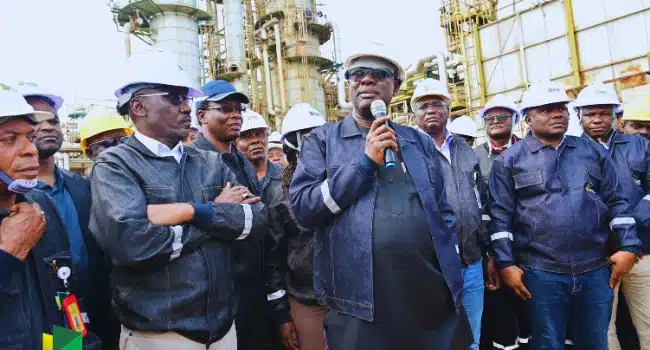Senator Heineken Lokpobiri, Minister of State for Petroleum Resources (Oil), has stated that the modular approach is the quickest way to address Nigeria’s energy challenges, while the major refineries are being completely renovated.
Just recently, he praised the Waltersmith Group and the Nigerian Content Development and Monitoring Board (NCDMB) for their contributions to the Federal Government’s goal of increasing domestic refining capacity.
The minister expressed his gratitude to the company and the NCDMB for seizing the bull by the horns and starting local crude refining, thereby meeting a portion of the local need.
Lokpobiri made the remarks on Tuesday during a facility tour of Waltersmith Petroman Oil Limited in Ibigwe, Ohaji-Egbema Local Government Area of Imo State, according to a statement issued by NCDMB Corporate Communications on Wednesday evening.
“The quickest way to fix our energy challenge in the country should be through modular refineries, while we await the total rehabilitation of the big refineries” , he told reporters.
He stated that since its commissioning in 2020, the 5,000-barrel per stream day Waltersmith Petroman has been a consistent supply of diesel, kerosene, naphta, and premium fuel oil to the local market, demonstrating how useful such smaller processing plants may be.
Lokpobiri praised the NCDMB for investing in Waltersmith Refinery, allowing the modular refinery to be completed rapidly.
While praising Waltersmith Group, he urged enterprises granted modular refinery and marginal field licenses to follow Waltersmith’s lead and make careful investments.
“If you have a marginal field, an allocation, it is a piece of paper given to you; it doesn’t add value to you or to Nigeria unless you take it to the next level by making the necessary investment and then adding the value that is expected,” he remarked.
“What I am seeing is that out of the numerous marginal fields that were allocated, only Waltersmith and a few of them have been successfully driven,” he said, recalling his warning at the recent Nigeria Economic Summit Group (NESG) event in Abuja that marginal field allocations without the necessary investments risk being cancelled.
The minister explained the importance of such a course of action, saying, “It is important that we make this point so that we can retrieve some of those fields to the basket,” in order to reallocate such assets to those who are capable and willing to develop and exploit them for the benefit of the industry and the nation.
He announced that he had secured presidential authority to undertake a new round of bidding, which would take place soon, pledging that “marginal fields would (henceforth) be prioritized in terms of their location to those who have modular refineries, so that they will be able to produce.”
While recognizing Waltersmith’s amazing success story, whose management had announced plans for additional development, Lokpobiri stated, “I can assure you that this Government will do whatever we can to support you so that you can continue to grow.”
Similarly, he thanked the NCDMB, whose direct involvement in the form of equity participation considerably aided the refinery’s take-off and operations.
Read Also: Ogun Customs seizes N398m in contraband, earns N30m
In his remarks, NCDMB Executive Secretary Simbi Wabote stated that the board’s decision to participate as an equity holder in Waltersmith was influenced by the company’s strong sense of mission and impressive organizational structure.
According to him, NCDMB had no issue in partnering with Waltersmith “given the very clear corporate governance that is required and exists within the company,” and that “part of our mandate is to enhance development and we see ourselves as catalysts for the industrialisation of Nigeria.”
“At NCDMB, we are proud of what we have achieved here (at Waltersmith),” he told reporters.
Mr Abdulrasaq Isa, President and Group Chief Executive Officer of Waltersmith Petroman Oil Limited, stated that the company’s expansion plans include increasing the processing plant’s capacity from 5,000 to 40,000 barrels per stream day and producing two million tonnes of petroleum products per year.
Since its commissioning in 2020, the refinery has provided a total of 600 million liters of petroleum products to the Nigerian market.
Join Television Nigerian Whatsapp Now
Join Television Nigerian Facebook Now
Join Television Nigerian Twitter Now
Join Television Nigerian YouTUbe Now






















